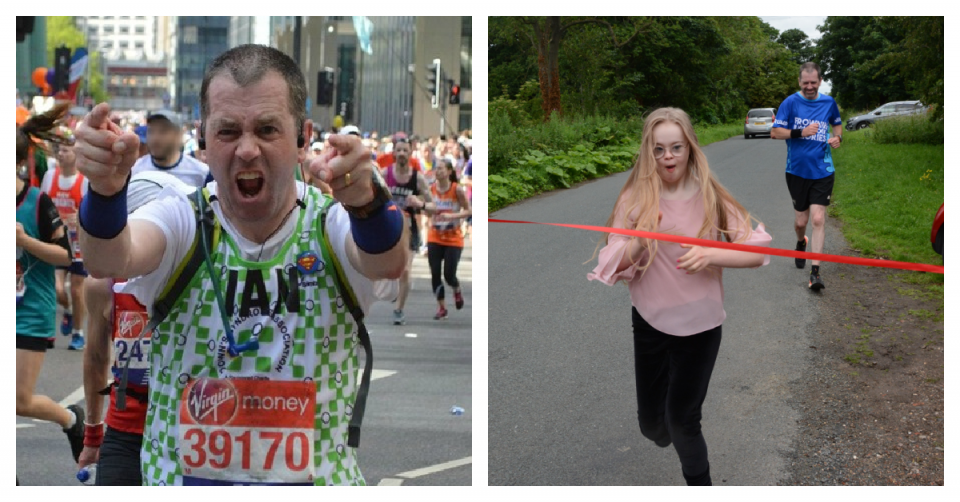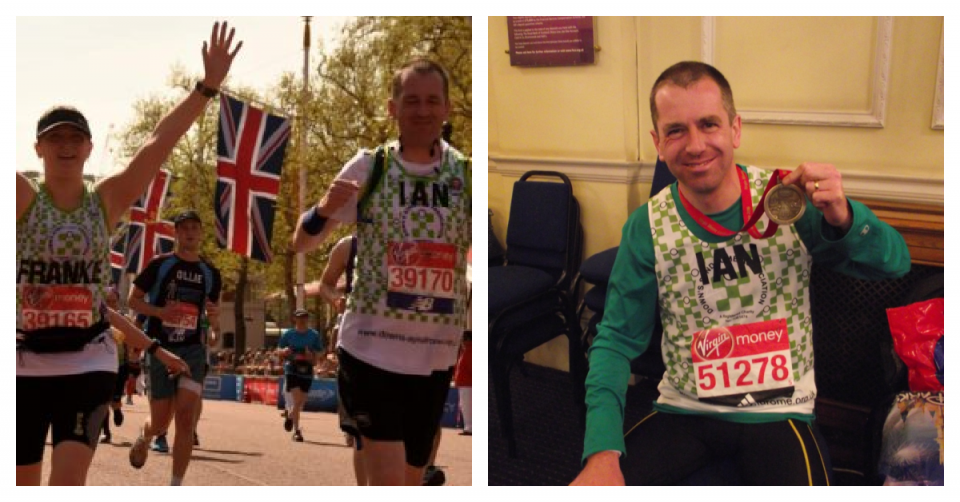Ian Fergusson has run the London Marathon for the Down’s Syndrome Association (DSA) for the past 12 years, making him a veteran runner and an absolutely fantastic fundraiser. He has a dedication and passion like no other, and he just keeps coming back for more.
Ian, it’s amazing, but why have you chosen to run for the DSA again this year?
I have run for the for the last 12 years, completing the London Marathon in DSA colours every time, including the 2020 virtual event. I completed my first marathons in 2007-8, for different charities. Whilst pleased with my fundraising, I would have to be honest and say that I ran for them because they gave me a marathon place, not because I had any real affiliation to them.
When my niece, Megan, was born with Down’s syndrome in 2008, it made me look at charity running differently.
The DSA was the only charity I applied to for the 2009 London Marathon. I have run for the DSA every year since, and for no one else since.
The pride of fundraising for and, in a small way, representing the DSA has made the whole experience so much greater.

In 2019, I was approaching the halfway point, just coming over Tower Bridge. As ever, you are starting to feel the effort by this point and you need to dig in and keep going. As I often do, I ran wide at the corner to wave at the crowd and encourage them. Approaching the crowd, a young boy, in his father’s arms, held his hand up to high five me. I did so and then realised that the boy had Down’s syndrome. A wonderful moment and timely reminder of what I was doing this for.
How has the DSA helped you and your family?
From a personal point of view, the DSA team have become good friends and supporters of my training and efforts which has made the whole marathon experience so much greater. For my niece Megan, and her family, I know that the information, help and support the DSA, and other local organisations, have provided have been a great help over the years. Even knowing that the DSA is there is always a great benefit.
Have you started training yet and how is it going?
I’ve never really stopped training, as I run throughout the year. Things are going well and, running the Virtual London Marathon for the DSA last October, I ran my quickest time in five years. It is a long way to October, but I will be fit and ready come the day! I also completed my 50th overall marathon in July 2020 and was delighted to have Megan run across the line ahead of me to support me (see photo above).
What will keep you going when things get tough?
You can guarantee that, at some point, every marathon gets tough. When that happens, grim determination and the desire to continue to put one foot in front of the other drives me along. Positive thinking is critical.
As you come across Tower Bridge and hit 13.1 miles, ‘you haven’t still got 13.1 miles to go’, instead you are ‘halfway there’. When you get to 20 miles and it is really tough, you don’t have six miles to go, it is only six miles and you’ve already done 20, so that is easy!
Moreover, every runner who sets off for the DSA is not running just for themselves. You are running for all the members, the supporters, those who have contributed to your fundraising and often the family member you are running on behalf of. When it is tough, you run for them.

You’ve run a whopping 12 marathons for the DSA throughout the years. Why do you keep coming back for more?
I come back for more because I want to run for this cause. When Megan was looking through one of the DSA magazines and saw me featured in a London Marathon article, she was delighted to point out to her parents that it was ‘Uncle Ian!’ That makes me proud and happy. I’ll be there for as long as the DSA want me to run.
What advice would you give first time marathon runners who are training now?
- You cannot run a marathon unless you are fit. Wherever you are now, there is time to get marathon fit by October. Set a training plan and stick to it, especially the long runs. However, the mental toughness to keep going regardless of how you feel is even more important.
- Decide what success means to you and then train with that in mind. Do you want to get round in a certain time? Do you want to get round non-stop? Are you happy to walk / run it?
- Don’t miss the experience! If it is your first London, especially if you do not intend to be back every year, get as much as you can out of the experience. Interact with the crowd, watch out for the landmarks, help others along the way and give some noise to the DSA cheering point in Canary Wharf (don’t miss it like I did the first year!) It isn’t just any race so don’t treat it like one.
Thank you Ian! Excellent advice from someone who certainly knows his stuff.
